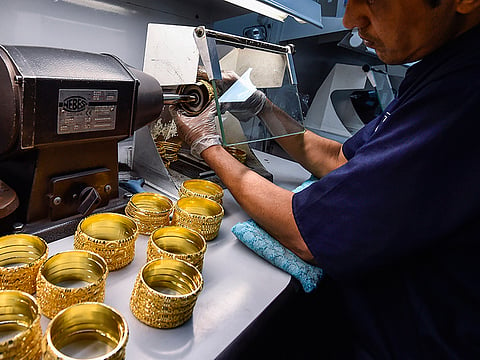India’s Malabar Gold to use Dubai as production base for overseas push
Indian jeweller to develop 20,000 sq m. plot in Jebel Ali for gold and diamond jewellery plant

Dubai
The retailer Malabar Gold & Diamonds has decided to go ahead with a gold jewellery design and manufacturing facility in Dubai, with the location being in Jebel Ali. The plant, expected to have a monthly capacity to handle 1,500-2,000 kilos of gold jewellery designing and over 2,000 carats of diamonds, will take two years to build. The cost is estimated at Dh100 million, including the value of the precious metals and stones.
Malabar already operates a production facility, albeit smaller at 1,000 kilos a month, in Sharjah. “With the second plant, Dubai will be the hub for all of our international operations,” said M.P. Ahmad, Chairman. “We did have the plan for some time, but went slow on taking a final decision. Now, we have decided to revive the project and fast-track it for completion in two years.”
The timing is what counts. By raising local production capacity, Malabar will not have to rely on importing jewellery from its facilities in India, and thus avoid the 5 per cent import duty in Dubai. Plus, with the Dubai plant also being in a position to export to its other non-India operations, the company also hopes to be in line for VAT-related rebates/incentives.
The Sharjah facility would down the line be utilised for more generic design pieces, where the emphasis on simple design and higher gold content. (Currently, there are no import duties on bullion into Dubai. Same is the case with loose diamonds. Jewellery attracts 5 per cent of the overall value.) “Currently, we have 104 stores outside of India (and 90 in its home territory) — that will require a significant amount of stock to be created in Dubai and shipped out,” said Ahmad. “If in the process, we get exemptions on certain duties — such as that on jewellery imports — then it makes for an extremely competitive operating environment.
“A lot of the production will be utilised within the UAE, each time we open new stores, and in the Gulf. I don’t think gold and jewellery retail expansion possibilities have reached a peak.”
On the land for the new plant, Malabar has struck a win-win agreement with the authorities. It is under a lease agreement, and offered on quite favourable terms. “The authorities are giving all sorts of incentives to spread the ‘Made in Dubai/UAE’ stamp on value-added products,” said Ahmad. “In that respect, high-value jewellery design is one way to get that exposure.”
The Dubai plant will be built on 20,000 square metres at a location near Dubai Parks & Resorts.
Meanwhile, the $4.5 billion Malabar Group, will simultaneously expand on its real estate development interests, but in India. Currently, gold and jewellery make up well over 85 per cent of the group turnover.
But the strategy is to push real estate’s contribution to be about 30 per cent in the medium term. This will be built up through upscale residential communities, principally in the southern Indian state of Kerala.
“If we are able to recreate a similar sort of lifestyle and experience in India that Dubai’s prime freehold communities have done, I think we can be quite successful,” said Ahmad. “There are a lot of white-collar Indian professionals in the Gulf and even elsewhere who want to buy property back home. If we create the community-themed concepts they are used to in UAE, we can win their business.
“We do not want to be exposed to just the jewellery business for future growth. The economy’s going through difficulties, demonetisation had shaved off growth for jewellery sales, and hit the industry hard.
“Real estate development and sales, whatever be the state of the market now, can offer us growth opportunities in the mid to longer term.”
Apart from residential communities, it is also building malls in three of the key cities in Kerala. Next month, it will launch residential projects in Karnataka, including in the capital Bengaluru.
The group will also be open to joint ventures with those holding significant land bank, whereby Malabar will handle the development and selling while the partner provides the land.
Currently, property development contributes Rs10 billion to the turnover. The target is to reach Rs30 billion by end of the decade.
Sign up for the Daily Briefing
Get the latest news and updates straight to your inbox



